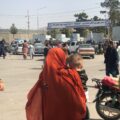
Workshop
Above all, they are our brothers and sisters
By Susanne Janssen (Living City Magazine)
The Kino Border Initiative takes care of people who were rejected at the Mexican border or deported
Nogales, Sonora, a Mexican city directly on the border with Arizona, is both a place of hope for those who try to cross the border to seek asylum in the U.S. and a place of despair for those rejected or deported. Many who just tried to enter the U.S. illegally are brought here, and more and more people who have lived in the U.S. for decades are now being sent back, often leaving their lives and families behind.
In many instances they had come a long way. Originally from El Salvador or Guatemala, they find themselves in Mexico without any family, or any closer to crossing the border. Without cash or a phone, they are lost. When they are detained in the U.S., their belongings are taken from them, including money, which when they are deported is given back in the form of a U.S. check. In Mexico, they are unable to cash a U.S. check at any bank, which increases their vulnerability.
A beacon of light
The Kino Border Initiative’s (KBI) migrant outreach center is a beacon of light in the darkness that these people are facing. The center, named after a Jesuit missionary from the early 18th century, provides two meals a day, clothing, a phone call and first aid, among other services.
They also find spiritual support: a prayer before the meal is so much more than just a common practice. It brings them back to the roots of their faith, and they entrust their lives, their future and their families to God, a Father who cares for them.
“A lot of women with their children are here looking for shelter — they are very vulnerable. Some of the women have been assaulted and abused during their migrant journey. Here they have a safe haven,” says Fr. Sean Carroll SJ, who has been KBI’s executive director since 2009.
In 2006, after serving for years as associate pastor at Dolores Mission Church in Los Angeles, he participated in the
exploratory phase of a new migrant ministry to be established in Southern Arizona and Northern Mexico. These efforts led to the inauguration of the Kino Border Initiative, a Catholic, binational collaborative effort that focuses on humanitarian assistance, education, research and advocacy in the area of migration.
The reality of deportation
When the center was initially founded, more than 150 people would come daily. Now around 80 people come to the KBI every morning, but the number is again on the rise. The recent change in the immigration policy of the U.S. has led to an increase in the deportation of people arriving in Nogales.
“And sometimes they are not people who just crossed the borders, but those who have lived in the U.S. for 5, 10 or over 30 years,” says the Jesuit.
In the past, illegal immigrants in the U.S. were not a priority for deportation, but now any immigrant without documents faces the danger of being arrested and returned to their home country.
“Very often, families are separated through these harsh processes, which cause great harm to their children.” They don’t understand why their parents don’t come back and feel abandoned.
“This is a whole life; they leave their family members behind and everything they’ve built over the last decades of their life.” There are incredible hardships that staff and volunteers get to know every day.
What drove them north?
Last year a survey of 7,756 migrants was conducted at the outreach center on the Mexican side of the border, and 85% said that they migrated due to economic need. “One woman from Central Mexico stated that she faced the choice of paying her rent or feeding her grandchildren. This reality drove her north to find a way to support her family,” Carroll shares.
The recent caravan of migrants from Central America coming north through Mexico is representative of a much larger group forced to leave their countries due to epidemic violence. In January, a human rights advocacy group, the Washington Office on Latin America, confirmed that El Salvador, Guatemala and Honduras remain among the most violent countries in the world: 95% of all homicides remain unpunished.
Migrants leave these countries in response to gang threats against their lives and horrific murders committed against their loved ones. In recent years they have increasingly sought asylum not only in the U.S., but in countries like Mexico and Costa Rica as well.
Immersion experience
Carroll and his staff try to raise awareness about the reality of migration by traveling around the U.S. and talking about their work. They also offer an “immersion experience” for high school and college students.
One who had participated wrote afterward of his initial skepticism about the program; but after speaking with deported migrants in Nogales and tracing their footsteps in the southern Arizona desert, he began to recognize, value and cherish their humanity more deeply. He went home determined to volunteer with immigrants in his own community, and to do what he could to make a difference to help them.
Immigrants without papers have faced difficulties living in the U.S. Even though they have come and stayed for decades, now suddenly their stay is uncertain. “When their parents are dying in their countries of origin, they want to see them again; but if they leave the U.S., it is very difficult to return afterwards,” he says. Legal immigration is even more difficult for migrants with limited education from a poor, violent country.
This is more than immigration
However, can we just blindly welcome all migrants? Don’t we have to think about the welfare and prosperity of “our” people too? Carroll affirms that this is “an important question, but our tradition calls us to foster and promote the common good, which regards care for people both within our country and beyond national boundaries.” In the end, “We are called in the Bible to welcome the stranger.”
While these voices keep resonating, the KBI director is also moved by the level of support: financial donations, clothes, prayers. “There is so much solidarity. Yes, we feel opposition by some people, but also a great generosity.”
Some life stories that he listens to every day in the center just speak for themselves: “There was a woman whose mother and brother were murdered, her husband was beaten up — the family saw no other solution than migrating north.”
And he will never forget one special Christmas: “One pregnant woman crossed the border, she was very close to give birth to her child, but she was caught in the desert and sent back to Mexico. She could have died, but she wanted a better future for her child.”
They welcomed her, and it was just before Christmas that she gave birth to her son whom she named Emanuel, “God is with us.”
“God is with her, in the midst of uncertainties, worries and doubts. When the migrants come here, they open themselves to God and allow God to enter in their troubled lives. And then, most of the time, they leave a little more strengthened and confident.”
In his book Immigration and the Next America, Archbishop Jose H. Gomez of Los Angeles wrote: “Immigration is about more than immigration. It’s about renewing the soul of America.”
If we can respond more effectively to the fundamental reasons people migrate while respecting human rights, we will be on the path to renewing our own souls, both individually and as a country.






